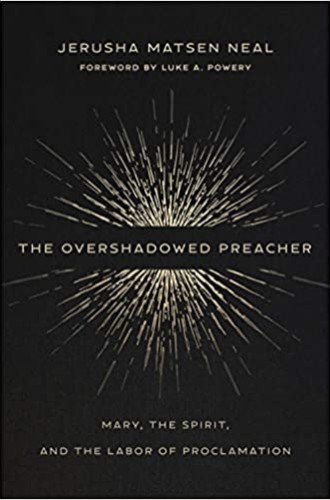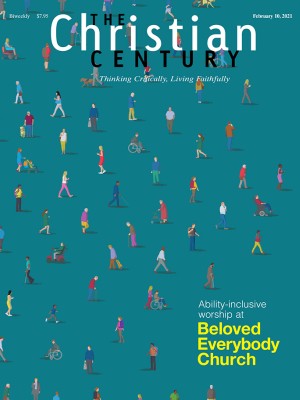Is preaching “all Jesus” or “all me”?
Jerusha Matsen Neal writes for preachers who stand in the messy middle.
On the first day of our introductory preaching course, my colleague presents a continuum. At one end is the view that the preacher has sole responsibility to make the gospel heard, to get Jesus to show up in the sermon. At the other end, it’s all grace; the preacher is an empty vessel. Then she asks this question: Is there a way to affirm something of both ends of the spectrum, to imagine the confluence of divine and human activity somewhere in between?
Jerusha Neal’s The Overshadowed Preacher plays beautifully in this messy middle. But it’s serious play, because there is real danger when we get it wrong. Neal, who teaches preaching at Duke Divinity School, suggests that one danger is the risk of collapsing the divine promise into the human performance, identifying Jesus’ presence in preaching with the preacher’s rhetoric and bodily presence.
Read our latest issue or browse back issues.
Furthermore, preaching traditions have imagined that only certain bodies can express this identification—usually White, straight, male bodies. Women, people of color, and people who identify as queer know that most pulpits were not built for them. But there is room for them in Neal’s book, where their voices are movingly heard.
What Neal does so successfully is offer a vision of preaching in which real human bodies of every kind can, through their dependence on the risen Jesus, become the location for Jesus’ always complicated presence through preaching.
Neal impressively engages a wide array of conversation partners with her constructive account of preaching, drawing on feminist and womanist scholarship, biblical scholarship, sacramental theology, race theory, performance studies, and contemporary homiletics. She marshals three primary theological resources: Protestant sacramental theology, especially that of John Calvin; preaching recorded in the book of Acts; and, most importantly, Mary’s labor to bear Jesus, the incarnate Word, into the world, which becomes a generative metaphor for the human and divine concurrence in preaching.
Calvin’s eucharistic theology helps Neal establish that in preaching—which, for her, is sacramental—Jesus is never simply present in an uncomplicated way. Because of the ascension, his presence is always in relationship to his absence. This stress on Jesus’ absence-in-presence and presence-in-absence is a central motif of the book, for it guards against collapsing the identity of Jesus with that of the preacher or the sermon.
Neal sees this same dialectic between Jesus’ presence and absence in sermons in the book of Acts, a tension which unsettles the identity, agency, and communal role of the preacher. Sermon performance in the messy middle will not leave the preacher unchanged when the preacher lives in faithful dependence on Christ through the Spirit. “The body of Christ remains Other, accessible through the Spirit’s gift and mediated through the vulnerability of lived relation.”
Central to the book is Neal’s nuanced interpretation of Mary as one who embodies that vulnerable lived relation to the body of Jesus through the power of the Spirit who “overshadowed” her. In the same way that preaching traditions have offered dangerously idealized notions of who can preach, traditional interpretations of Mary, according to Neal, have rendered Mary a cipher for idealized womanhood. Her own particularity is erased.
But not in Neal’s reading of Luke’s account of the conception and birth of Jesus, where Mary shows up in all her bodily particularity. Because her relationship with Jesus unsettles her own identity, agency, and communal role (just like those preachers in Acts), what emerges is a picture of fully human dependence on Jesus through faith and a metaphor for the preacher’s own birthing of the Word. “We cannot be who Mary is. And yet as a metaphor contextually discerned, Mary suggests ways to describe an embodied relation with Christ’s body—a relation that is Spirit-inspired and fully human.” This metaphor, then, points to the preacher’s “sacramental significance.”
Neal says that “there is no script for us to follow” when considering the practical implications of this metaphor. She doesn’t offer a model for sermon development, an ideal sermon form, or directives for delivering the sermon. Rather, she suggests that the three verbs given to Mary by the angel—conceive, bear, and name—be allowed to shape the preacher’s own sermon performance. Preachers will want not simply to read but to ponder deeply the rich wisdom of the book’s last three chapters.
If I could engage Neal in further conversation, I would ask her this: What work is the dialectic of presence and absence doing? Why absence? In the book’s early chapters, often the emphasis on absence shows up as a way to secure differentiation, so that the presence of Jesus can’t be collapsed into the preacher’s bodily performance. This ensures that Jesus’ presence is always an uneasy presence (perhaps Neal’s favorite word). Yet she often couples the mention of Jesus’ absence with the notion of his otherness.
While the theme of Jesus’ absence all but disappears from Neal’s final three chapters, she affirms there that “the Word a preacher bears is Other. Embodied relation with the Word does not remake the Word in one’s own image, even when Word and preacher bear a family resemblance. It means allowing for a differentiation that can challenge and change the preacher.” This seems to me the real point.
When I step into a pulpit, I rely on faith in Jesus’ presence, which fills me with both confidence and dread, precisely because Jesus’ presence is not in my control. But I’m not yet clear how that otherness also implies absence—or whether knowing that it did would unsettle my preaching in a healthy way.
If we were able to have this conversation, I’m certain, given the breadth and depth of Neal’s book, it would lead down all kinds of delightful alleyways and deliver additional insights. But one thing is clear: preachers who play in the messy middle between “it’s all me” and “it’s all Jesus,” longing to imagine how their own preaching performance can faithfully bear Jesus—especially those preachers whose own bodies have often been denied a place in the pulpit—will find challenge, insight, and inspiration in this rich book.
A version of this article appears in the print edition under the title “All Jesus or all me?”






